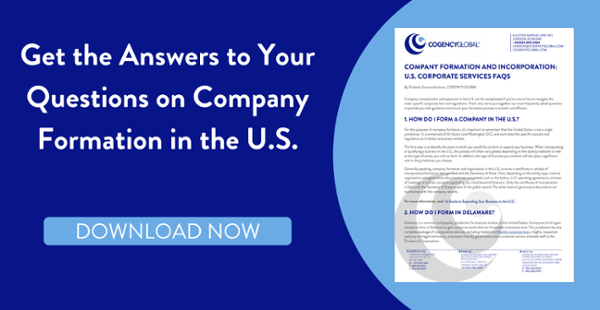 Business expansion in the U.S. can become complicated if you’re unsure of the various formation and registration processes in each state. How do you know which jurisdiction to choose to form your company?
Business expansion in the U.S. can become complicated if you’re unsure of the various formation and registration processes in each state. How do you know which jurisdiction to choose to form your company?
Often businesses abroad aren’t aware that when forming a company in the U.S., the choice of state requires analysis of several factors (i.e. type of business conducted, short and medium-term expansion plans) as well as extensive legal and tax advice.
This article takes a look at key considerations when moving forward with business expansion in the U.S., as well as some examples of jurisdictions to choose from depending on the type of business you conduct. Read on for more.
Your Key Considerations: Comparing Formation Options in the UK vs. U.S.
The following is a breakdown of the differences between the UK and the U.S. when it comes to business expansion, determining which state(s) to register in the U.S., as well as what entity type will best fit your business and meet legal and tax goals. While this varies from country to country in Europe, we’ve chosen the UK as an example to demonstrate the distinctions.
Choosing a Jurisdiction
UK: All companies are registered with the Companies House. However, they can establish their registered offices in any UK country: England, Wales, Scotland or Northern Ireland, depending on their business requirements.
U.S.: In the U.S., there are 50 different states plus Washington, D.C. Formation in each state is governed by state-specific statutes and requirements. There are multiple jurisdictions to choose from, and depending on the type of business conducted, one jurisdiction might be a better fit over another (see below for more information on choosing a U.S. jurisdiction).
Registered Office or Registered Agent
UK: In the UK, it’s mandatory for a company to have a registered office in its country of incorporation. The registered office is the address where all statutory registers and records of the company are kept; unless an alternative location has been nominated specifically for this purpose (known as Single Alternative Inspection Location). It’s also the address where legal notices can be served on the company. In addition, all correspondences from statutory authorities are sent to this address.
U.S: Similar to a registered office, in the U.S., a registered agent is also an office in which legal notices may be served. For the most part, it’s not mandatory for books and records to be housed in a registered agent’s office.
Availability of Information to the Public
UK: In the UK, a lot of information about a company is made publicly available. This includes the directorship and shareholding information, financials, the details of the individuals with significant control over a company, as well as the charges and mortgages against a company.
U.S.: Once you form and register a U.S. entity, only a limited amount of information about the company is available to the public. Director and officer information (or the equivalent for different entity types) is not available in all states. Ownership information is not part of the public record for any privately held companies.
Standard Formation and Organisation
UK: In the UK, company formation involves filing an incorporation form along with the memorandum and articles of association of the proposed company.
Standard governance documents include:
- Memorandum of association: One-page historical document about the incorporation of the company.
- Articles of association: This is the detailed document about the governance of the company, including the board of directors and its members.
Note: The above documents and every amendment thereof are part of the company’s public record.
U.S.: First, a certificate or articles of incorporation/formation get filed with the secretary of state. Then, depending on the entity type, any internal organisation and governance documents are completed, such as bylaws, LLC operating agreements, minutes of meetings or written consents appointing the initial board of directors. Only the certificate of incorporation is filed with the Secretary of State as part of the public record. The other internal governance documents are maintained internally with the company records.
Standard governance documents for corporations include (they’ll be different for other entity types, for example, Limited Liability Companies):
- Action by the incorporator: This document elects initial directors.
- Initial organisation written consent of directors: This document elects initial officers as well as approves bank accounts and other initial corporate actions.
- Bylaws: This is a detailed document that governs the company’s management responsibilities and structure, the cadence of annual meetings, procedures, and dispute resolution processes.
Related read: International Subsidiary Management: 3 Key Requirements
Choosing an Entity Type and U.S. Jurisdiction
Now that you’re ready to expand your business in the U.S., how do you know which entity type to choose and which state to form and register your company?
When forming a business in the U.S., while it’s important to determine the most favourable state to incorporate or form, another important step is deciding what type of entity is best (e.g. a corporation, partnership, or limited liability company (LLC)). The best entity form depends on structure, liability, tax, and management considerations.
Once you’ve decided on the entity type after consulting with your attorney, it’s important to note that the jurisdiction where you choose to expand your company depends on the type of business you conduct.
Below you’ll find a sampling of U.S. states for company formation, along with some examples of common industries in each state.
- Delaware: Companies of all types choose to form in Delaware to gain access to the courts which are favourable to business laws. More than one million business entities representing many different business purposes take advantage of Delaware's complete package of incorporation services, including modern and flexible corporate laws, the highly-respected Judiciary and legal community, a business-friendly government, and the customer-service-oriented staff of the Division of Corporations.
- New York: Finance, trade, healthcare, real estate, media, publishing, manufacturing, information technology.
- California: Entertainment and film, technology (i.e. electronic computer manufacturing, software development, high-tech computers, and electronics), professional and business services, education and health services, financial activities, leisure and hospitality (i.e. tourism).
- Texas: Oil and gas, technology hardware and software firms, commercial construction.
As mentioned at the opening of this article, obtaining legal and tax advice from U.S. advisors at the early stage of formation of your company will help support the important analysis specific to your business goals in the U.S.
In your early plans to expand your business in the U.S., your advisors will review the nature of business you’ll conduct. This includes in which states, your growth plans over time as well as your interest in seeking investment. This helps to make the most favourable decisions on which states to form/qualify along with what entity type to choose.
You can then confidently proceed with making the required filings to form and register your company in the appropriate states in the U.S.
Consult a Service Provider
Similar to deciding where to form/qualify to do business and choosing the best entity type, completing formation documentation and coordinating the actual filings with each state in the U.S. can become complicated. This is especially true when trying to navigate jurisdiction-specific laws and regulations.
As such, reaching out to a service provider can assist in your company formation and registration filings in the U.S., along with annual compliance services to ensure the company maintains good standing with each secretary of state.
To further help you through the process, we’ve put together our most frequently asked questions to provide you with guidance and ensure your formation process is smooth and efficient.
Click on the image below to download the free document.
This content is provided for informational purposes only and should not be considered, or relied upon, as legal advice.


